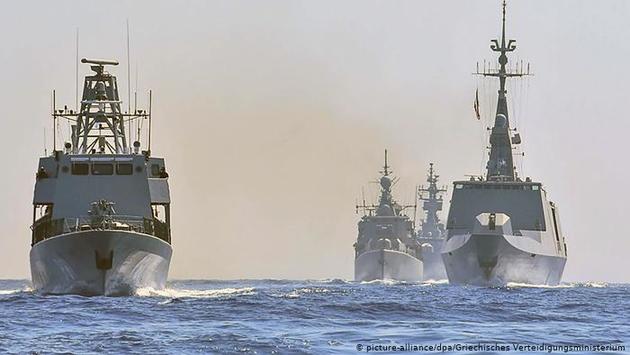The EU is preparing possible sanctions against Turkey, hoping to force concessions in Ankara's fight with Greece and Cyprus over Mediterranean gas reserves. Will they work? Bernd Riegert reports from Brussels for Deutsche Welle in his article EU to consider sanctions on Turkey over Mediterranean gas drilling.
Lawmakers in Brussels are drawing up a list of potential sanctions against Turkey, in an effort to get Ankara to limit its disputed maritime gas exploration in the eastern Mediterranean to its own territorial waters. European Union member states Greece and Cyprus feel threatened, and both have been working hard in recent weeks to get the EU to consider punitive measures.
Meanwhile, the situation continues to escalate with military maneuvers and talk of "cause for war" by Ankara. In late August, EU foreign ministers saw no other option than to draw up a list of specific sanctions, with the bloc's foreign policy chief, Josep Borrell, saying EU leaders "could" make a decision by a European Council meeting on September 24 — could, not should or would.
Greece, Cyprus pressing EU to act
For now, the EU remains cautious. Borrell continues to hold parallel negotiations with Turkey in an effort to de-escalate the situation, while Germany — which now holds the EU's rotating presidency — has attempted to mediate between the three countries, with little to show for the effort. Lists of potential sanctions are being produced and tweaked within the European Commission, as well as in the various EU Council working groups. Cyprus and Greece are concerned the process might get bogged down and have begun turning up the heat, much to Borrell's chagrin. Both countries have said they will only agree to sanctions against Belarus — which are finished and ready for approval — if sanctions are also leveled on Ankara. The measures can only be enacted by unanimous consent, so each member country can potentially block the move. On Wednesday, Cyprus showed it was ready to take that step by publicly threatening a veto.
Boats, banks and businesses could be targeted
Just who or what might be sanctioned in Turkey is still classified. Borrell, however, has hinted that measures will not only target individuals but also companies involved in the Turkish gas exploration projects. "Everything connected to the problem" could be targeted, he said. By that, he means research and drilling vessels could be prohibited from entering EU ports and would no longer be able to get replacement parts. But it could just as well mean that banks financing those companies could be targeted. Borrell has suggested that the next step could target entire business sectors "in which the Turkish and European economies are closely tied." That also means the European Union Customs Union, which allows for the customs-free exchange of goods between Turkey and the EU. Turkey has long wanted to expand the union, the EU could now limit it. It's also conceivable that the EU could formally end its long-running negotiations with Turkey over EU membership, a move openly supported by Austria. The rest of the bloc, however, isn't so sure. The customs union and membership negotiations are the two biggest diplomatic weapons in the EU arsenal.
What effect would sanctions have?
"Turkey won't be impressed by 'big guns," said Sinan Ulgen of Carnegie Europe, a think tank in Brussels. "Ankara doesn't think there will ever be unanimous EU support to issue sanctions. It's too counterproductive." Ulgen, a foreign policy expert from Turkey, said the EU has a dilemma on its hands. "The EU must be unanimous in its vote. That will ensure sanctions are watered down to such a degree that they won't be able to change Turkey's behavior," he said. Ulgen said he isn't advocating tougher measures, but told DW that specific sanctions targeting individuals and companies make no sense because they are ineffective.
German Economy Minister Peter Altmaier is even more skeptical. Asked about Russian sanctions by German broadcaster ARD, he said he couldn't think of one example in which such measures had ever caused a country to change its behavior. He said sanctions only lead to a hardening of political fronts. Other experts, however, like Janis Kluge from the German Institute for International and Security Affairs (SWP) in Berlin, see sanctions as an effective tool for sending a signal and for affecting long-term political change.
How about a little carrot?
"I really believe, and I think we can compare different situations, that targeted sanctions can also have an effect," said Sergey Lagodinsky, a foreign policy expert and EU parliamentarian with the Green Party. He said it's about sending a signal to the Turkish government and getting it to turn its hostile rhetoric "down a notch." After his meeting with EU foreign ministers in late August, Borrell said one could not only offer Turkey the stick but must show it the carrot as well. That could mean incentives such as the expansion of the customs union, in the event that Ankara relents in the gas conflict.
Carnegie Europe Turkish expert Sinan Ulgen said that until now, Ankara has seen the EU as a kind of mediator. That wouldn't be the case, should the bloc issue sanctions. Moreover, he said, Turkey would be sure to answer with sanctions of its own. That's why Lagodinsky prefers dialogue. "We haven't exhausted every possible approach to calming the situation and coming up with a common solution for an equitable security architecture in the Mediterranean," he said. Another solution for Lagodinsky: the EU and Turkey should consider developing alternative sources of energy, rather than always betting on gas.






